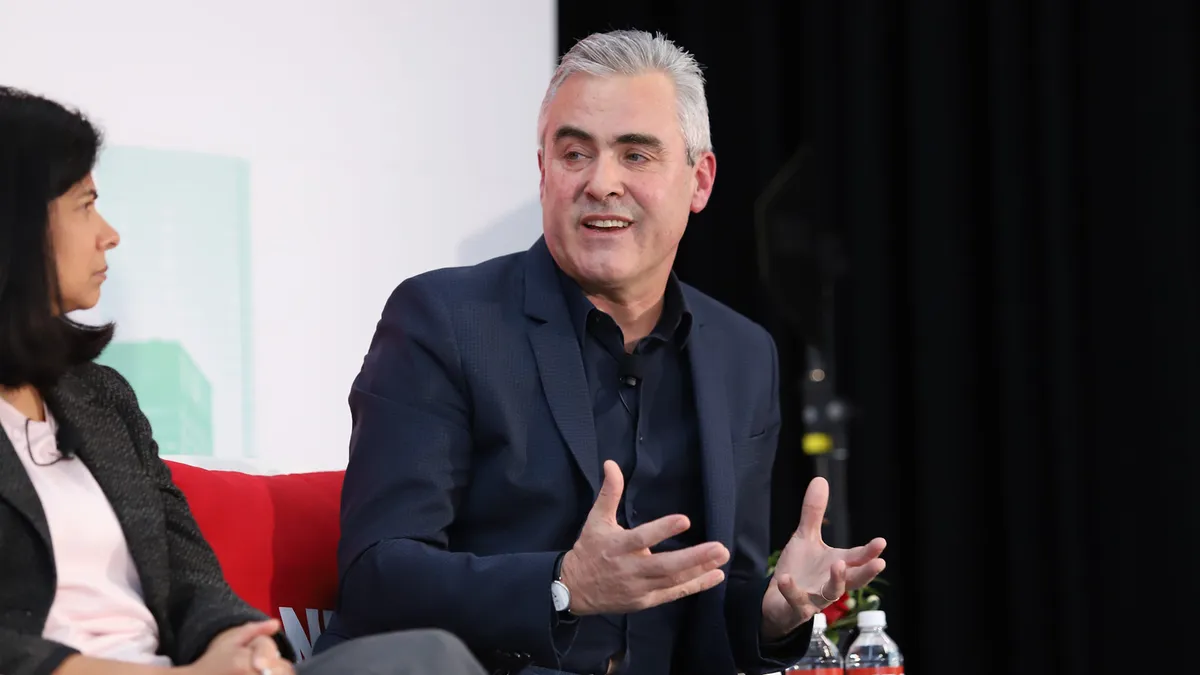UPDATE: Target has promoted executive Brett Craig to replace Mike McNamara as its EVP and CIO, the company announced Thursday. Craig joined Target in 2008 and most recently served as the retailer's SVP of digital. McNamara will serve in a strategic advisory role through January 2023 until his retirement.
The company also appointed Cara Sylvester, who most recently served as the company’s EVP and chief marketing and digital officer, to the newly created role of EVP and chief guest experience officer. Craig will report to Sylvester.
Dive Brief:
- Target EVP and CIO Mike McNamara, who has led the retailer's IT organization since 2015, plans to retire in 2022, according to an SEC filing submitted Wednesday.
- "The timing is great to begin the process of retiring and transitioning to a new CIO," McNamara said in a blog post announcing his forthcoming retirement. "The technology team and platform are in brilliant shape and our business is already taking on its next growth chapter."
- Target will conduct a "thorough internal and external search" for a new CIO, the company said in an email to CIO Dive. McNamara will continue to serve until a successor is appointed and transitions into the leadership role.
Dive Insight:
Through his leadership, McNamara helped Target overcome disruption as it scaled to meet new shopper habits.
In its 2020 fiscal year, the company's digital comparable sales grew 145%, a boost driven by the 235% growth spurt in tech-enabled same-day services such as Order Pick Up and Drive Up.
But the company's IT systems looked differently when McNamara joined the company. Target was in recovery mode after a 2013 data breach exposed over 40 million debit and credit card records. Its ballooning tech personnel added complexity too.
McNamara's technology strategy became a lesson in portfolio simplicity and vision. In 2015, Target had an IT workforce of nearly 10,000, mostly contractors — McNamara said last year, speaking at the National Retail Federation (NRF) conference. The size of the IT organization compared to the overall organizations "was a bit ridiculous; it's way too many," he said.
"Technology was and is too important to outsource," McNamara said in the blog post.
"I pushed for ruthless prioritization and greatly reduced the number of tech projects underway so we could focus on doing fewer but bigger things to help grow and modernize our business," he said.
Now, the company's IT workforce is closer to 4,500, with part of that contingent focused on data and AI capabilities. With data and AI, the retailer has tackled complex logistics problems, helping improve on-shelf availability, and decreasing out-of-stock levels.
Target has reasserted its place as a leader in the national retailing market, according to Bob Hetu, research VP at Gartner.
"It is positioning itself as the department store of the future, where technology will play an ongoing role in delivering results," said Hetu.
A new CIO at Target will need to focus on three key pillars, said Hetu:
- Technology assets and capabilities that consist of modular components where assembly and reassembly are automated.
- Culture that encourages the continuous exploration and creation of game-changing business capabilities.
- Business elements that can dynamically evolve to create new value elements.
McNamara encouraged in-house innovation through initiatives such as Demo Days, quarterly science-fair-like gatherings for technologists at Target to present and showcase new technology initiatives.
Target also aimed its tech organizations to enable automation, using technology to bring more efficiency to distribution centers and modernize its supply chain.












